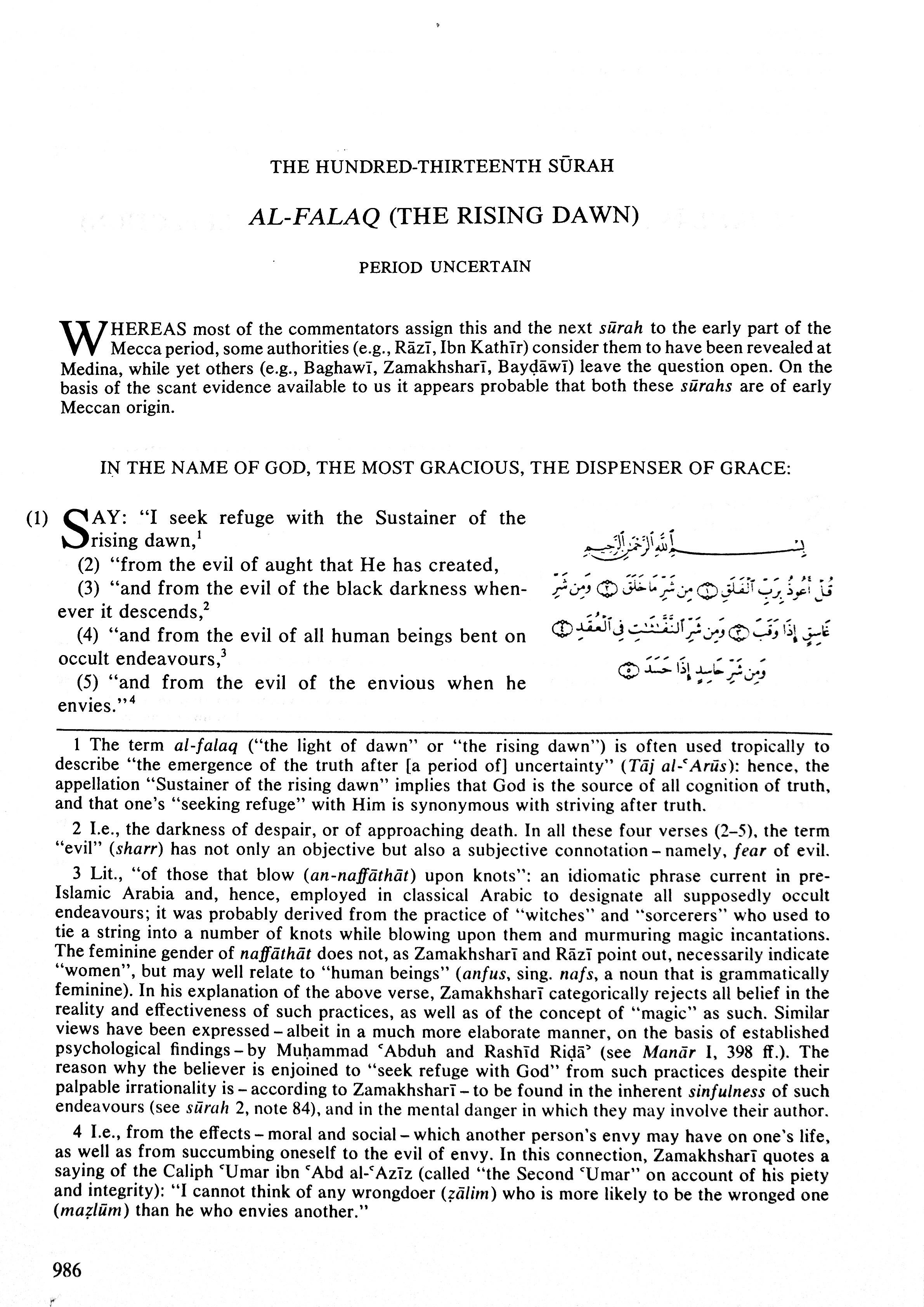Muhammad Asad, The Message of the Qur’ān; Translated and Explained by Muhammad Asad (1980)
Al-Falaq (The Rising Dawn)
Whereas most of the commentators assign this and the next surah to the early part of the Mecca period, some authorities (e.g., Rāzī, Ibn Kathīr) consider them to have been revealed at Medina, while yet others (e.g., Baghawī, Zamakhsharī, Bayḍāwī) leave the question open. On the basis of the scant evidence available to us it appears probable that both these surahs are of early Meccan origin.
(1) Say: “I seek refuge with the Sustainer of the rising dawn,1
(2) “from the evil of aught that He has created,
(3) “and from the evil of the black darkness whenever it descends,2
(4) “and from the evil of all human beings bent on occult endeavours,3
(5) “and from the evil of the envious when he envies.”4
1 The term al-falaq (“the light of dawn” or “the rising dawn”) is often used tropically to describe “the emergence of the truth after [a period of] uncertainty” (Tāj al-ʿArūs): hence, the appellation “Sustainer of the rising dawn” implies that God is the source of all cognition of truth, and that one’s “seeking refuge” with Him is synonymous with striving after truth.
2 I.e., the darkness of despair, or of approaching death. In all these four verses (2–5), the term “evil” (sharr) has not only an objective but also a subjective connotation – namely, fear of evil.
3 Lit., “of those that blow (an-naffāthāt) upon knots”: an idiomatic phrase current in pre-Islamic Arabia and, hence, employed in classical Arabic to designate all supposedly occult endeavours; it was probably derived from the practice of “witches” and “sorcerers" who used to tie a string into a number of knots while blowing upon them and murmuring magic incantations. The feminine gender of naffāthāt does not, as Zamakhsharī and Rāzī point out, necessarily indicate “women”, but may well relate to “human beings” (anfus, sing, nafs, a noun that is grammatically feminine). In his explanation of the above verse, Zamakhsharī categorically rejects all belief in the reality and effectiveness of such practices, as well as of the concept of “magic” as such. Similar views have been expressed – albeit in a much more elaborate manner, on the basis of established psychological findings – by Muḥammad ʿAbduh and Rashīd Riḍāʾ (see Manār I, 398 ff.). The reason why the believer is enjoined to “seek refuge with God” from such practices despite their palpable irrationality is – according to Zamakhsharī – to be found in the inherent sinfulness of such endeavours (see sūrah 2, note 84), and in the mental danger in which they may involve their author.
4 I.e., from the effects – moral and social – which another person’s envy may have on one’s life, as well as from succumbing oneself to the evil of envy. In this connection, Zamakhsharī quotes a saying of the Caliph ʿUmar ibn ʿAbd al-ʿAzīz (called “the Second ʿUmar” on account of his piety and integrity): “I cannot think of any wrongdoer (ẓālim) who is more likely to be the wronged one (maẓlūm) than he who envies another.”
